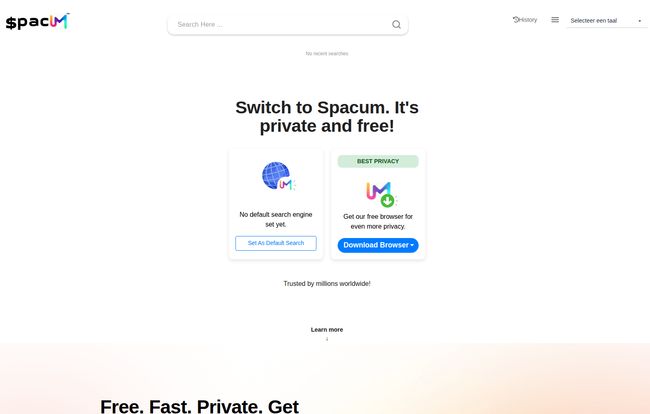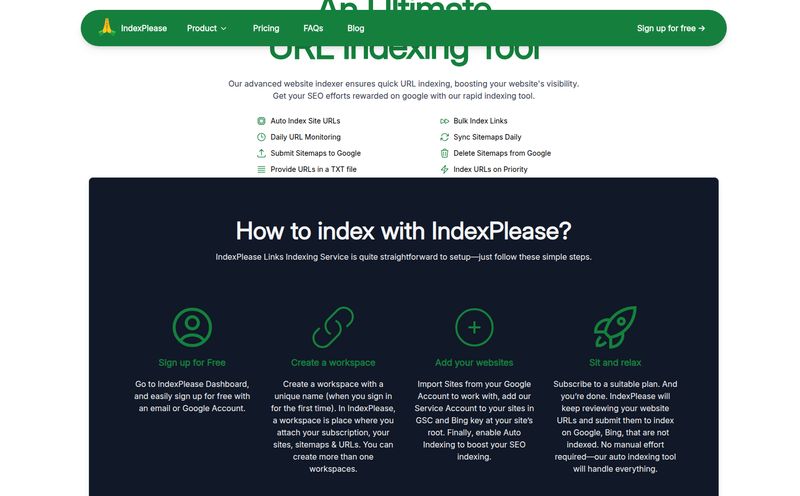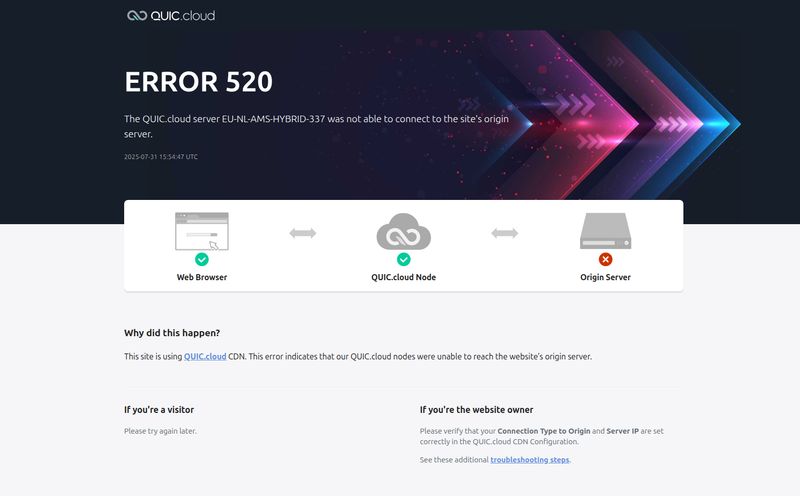Let’s have a little chat. You know that feeling, right? You mention you need a new pair of running shoes in a private chat, and suddenly, every single website you visit is screaming at you with ads for sneakers. It’s not a coincidence; it's the reality of the modern web. We’ve kind of just… accepted it. For years, I’ve been in the trenches of SEO and digital marketing, and I’ve seen firsthand how aggressive online tracking can get. It's the engine that powers a lot of the internet's economy, for better or worse.
But what if you could just opt out? What if you could slam the door on all those trackers, ad networks, and data harvesters? That's the promise of Spacum, a browser and search engine that’s been making some serious waves. I've been using it exclusively for a couple of weeks now, and honestly, it’s been a breath of fresh air. So, is it all it's cracked up to be? Let's get into it.

Visit Spacum Browser
So, What Exactly Is Spacum?
On the surface, Spacum looks like another web browser. You type in a URL, you search for stuff, you open too many tabs—you know the drill. But that’s like saying a tank is just another car. The real magic is under the hood. Spacum is designed from the ground up to be a privacy-first platform. It’s an independent company, not another arm of a tech giant, which is a big deal for anyone tired of being the product.
It's not just a browser; it's a whole privacy suite. It comes with a built-in, AI-powered search engine that doesn’t build a profile on you, and it actively blocks the creepy stuff that follows you around the web. Think of it as your personal digital bodyguard, the one who checks the guest list and throws out the party crashers before they can even get in.
The Spacum vs. Google Grudge Match
This is the big question, isn't it? How does it stack up against the 800-pound gorilla in the room, Google Chrome? The Spacum website has a pretty blunt comparison chart, and from my testing, it’s spot on. It's not just a minor difference; it's a philosophical one.
| Feature | Spacum Browser | Google Chrome |
|---|---|---|
| Blocks Ads by Default | ✔ | ✘ |
| Blocks Tracking Ads | ✔ | ✘ |
| Blocks Third-Party Cookies | ✔ | ✘ |
| Blocks Video Pre-Roll Ads | ✔ | ✘ |
Seeing it laid out like that is pretty stark. While Google is slowly—very slowly—talking about phasing out third-party cookies, Spacum just blocks them. Period. The web feels faster, cleaner, and way less desperate for my attention. It’s amazing how much mental clutter disappears when you’re not being constantly sold to.
My Favorite Spacum Features (The Stuff That Actually Matters)
Okay, let’s talk about the features that made me go from a curious tester to a full-blown advocate.
Tracker Blocking That Puts Up a Real Fight
This is the crown jewel. Spacum’s built-in tracker blocking isn’t some flimsy add-on; it’s the core of the experience. It stops those invisible scripts from Facebook, Google, and a million other data brokers from loading. You can actually see a little counter of how many trackers it blocked on each page. At first, it's just a number. After a week, you see you've blocked tens of thousands of tracking attempts, and it feels like a genuine victory. You get a real sense of how much surveillance you were unknowingly consenting to before.
AI-Powered Search Without the Creepiness
The term “AI search” can be a bit of a red flag these days. It often means a company is using your data to train their models. Spacum’s approach is different. Their AI-powered results are meant to give you smarter, more direct answers without logging your search history to build a profile on you. The search results are different from Google’s, and that takes some getting used to. But I’ve found them to be less cluttered with sponsored posts and SEO-spam. It feels more like a library index and less like a billboard.
Going Beyond the Browser: Email and App Protection
This was a pleasant surprise. Spacum also offers Email Protection, which strips trackers from your emails (yep, they’re in there too) and gives you a private @spacum.com address to use for signing up for stuff. Plus, for Android users, their App Tracking Protection feature attempts to block trackers in your other apps. It's an ambitious effort to create a privacy bubble around your entire device, not just your web browsing. Pretty cool.
Okay, But What's the Catch? A Reality Check
Alright, no tool is perfect. And in the spirit of a real human review, let's talk about the downsides. Switching away from Chrome isn't completely without its bumps.
First, the extension library. If you're someone who lives and dies by a dozen highly specific Chrome extensions, you might find Spacum’s selection a bit… leaner. It has the essentials, but it’s not the sprawling marketplace that Chrome is. For me, this was a feature, not a bug—it forced me to simplify my setup. But for power users, it's something to consider.
Second, as I mentioned, the search results can be different. Google has had decades to learn that when I type “best pizza,” I mean “best pizza near me that’s open right now.” Spacum is getting smarter, but sometimes its results feel a bit more literal and less context-aware. It’s a trade-off: hyper-personalized results for your data, or more generic, private results.
Finally, it's still a newer player. I actually hit a 404 page once while just clicking around their own site. Does that ruin the experience? No, of course not. It just reminds you that it's a living, breathing product being built by real people, not an untouchable monolith. There might be an occasional bug or a weird quirk. But then again, have you used Chrome lately? It's not exactly flawless either.
So, Should You Make the Switch to Spacum?
Here’s my take. Yes, you should absolutely give it a try. It’s free, it’s available on pretty much every device (Mac, Windows, iOS, Android), and the setup takes about two minutes. What do you have to lose? A few targeted ads?
For the average person who is sick of feeling watched online, Spacum is a fantastic, easy-to-use solution. It’s a set-it-and-forget-it way to reclaim a massive chunk of your digital privacy. For the tech-savvy crowd, it’s a robust tool that respects your intelligence and gives you more control. I still keep Chrome installed for a few work-related tasks that are deeply embedded in the Google ecosystem, but for 95% of my personal browsing, I’ve made the switch. The web just feels better this way.
Frequently Asked Questions About Spacum
Is Spacum really free to use?
Yes, one hundred percent. The Spacum browser and private search engine are completely free. There are no hidden costs or subscription fees for the core privacy-protection features. It's part of their mission to make privacy simple and accessible for everyone.
How does Spacum protect my privacy if it's free?
This is a fair question! Their model isn’t based on selling your data. Instead, they make money through private ads. When you search on Spacum, you might see an ad based on your search term (for example, an ad for a car if you search "car"), but it's not based on your browsing history, location, or personal profile. It's a much less invasive form of advertising that I can personally live with.
Is Spacum better than just using Incognito Mode?
Oh, absolutely. It's not even a competition. Incognito Mode (or Private Browsing) primarily just deletes your local browsing history on your own computer. It does NOT stop websites, your internet service provider, or Google itself from seeing and tracking your activity. Spacum actively blocks the trackers from those websites, offering a far greater level of actual privacy.
Can I use Spacum on my iPhone and Android?
You bet. Spacum offers full-featured mobile browsers for both iOS and Android, bringing the same tracker-blocking and private search capabilities to your phone. The Android version even includes the App Tracking Protection feature to block trackers in other apps on your device.
Who owns Spacum? Is it just another Big Tech company in disguise?
Nope. According to their site, Spacum is an independent company. They aren't owned by Google, Microsoft, or any of the other usual suspects. Their entire business model is built around providing privacy, so being acquired by a data-hungry tech giant would be completely against their ethos.
What about my bookmarks and passwords?
Making the switch is easier than you think. Spacum has an import tool that lets you pull in all your bookmarks, saved passwords, and browsing history from your old browser (like Chrome or Firefox) in just a few clicks. You won't have to start from scratch.
My Final Thoughts
Switching browsers can feel like a hassle, I get it. We get comfortable. But the status quo of constant, invasive tracking isn't something we should be comfortable with. Tools like Spacum aren't just software; they're a statement. They're a vote for a different kind of internet—one where our privacy is the default, not an optional extra. For me, that's a vote worth making.
Reference and Sources
- Spacum Official Website
- The Markup's Reporting on Data Privacy - An excellent resource for understanding the scope of online tracking.



